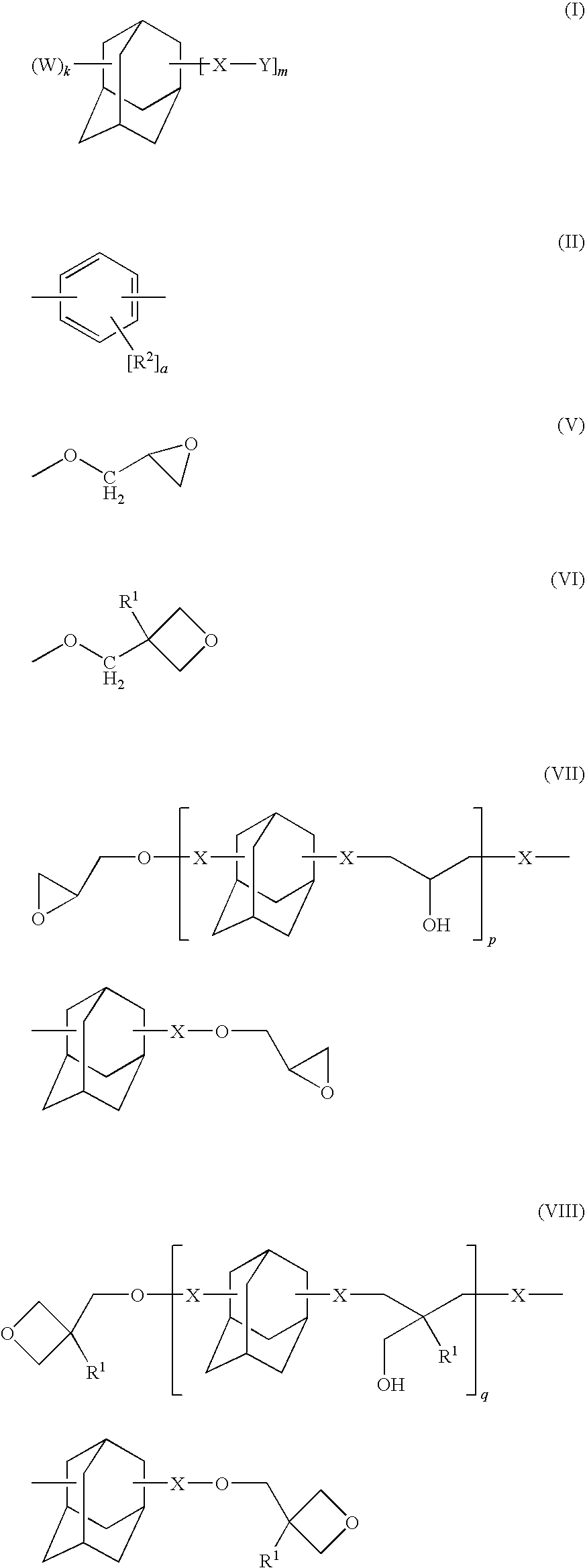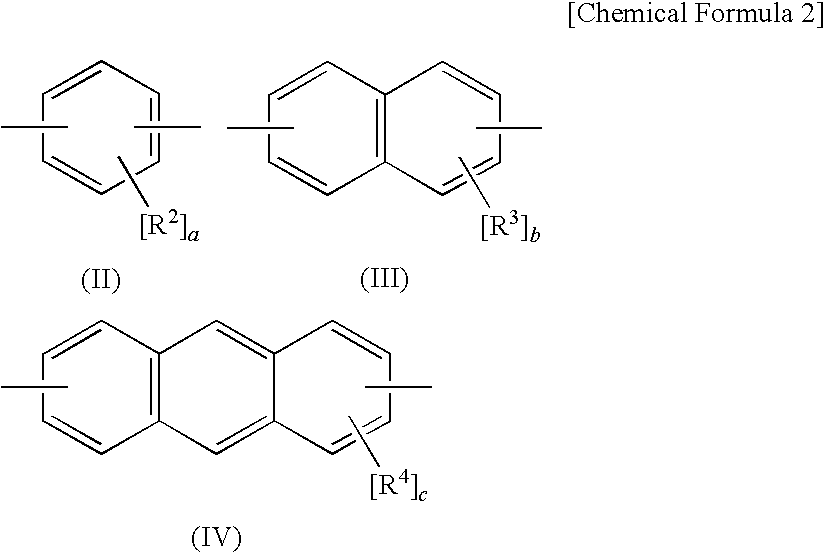Adamantane derivative, composition comprising the derivative, and optical and electronic member using the composition
a technology of adamantane and derivatives, which is applied in the direction of organic chemistry, lighting apparatus, lighting and heating apparatus, etc., can solve the problems of increasing dielectric constant, insufficient heat resistance, and limitation of conventional thermosetting resins such as bisphenol a epoxy resins, and achieve excellent heat resistance, long-term heat resistance and electric characteristics, excellent optical properties such as transparency and light resistan
- Summary
- Abstract
- Description
- Claims
- Application Information
AI Technical Summary
Benefits of technology
Problems solved by technology
Method used
Image
Examples
example 1
Synthesis of 1,3-bis(4-glycidyloxy-3-methylphenyl)adamantane and Purification Thereof
(1) Synthesis of 1,3-bis(4-hydroxy-3-methylphenyl)adamantane (BMP13)
[0116]In a flask having an inside volume of 100 mL, 8.4 g (50 mmol) of 1,3-adamantanediol, 37 g (400 mmol) of o-cresol and 3.8 g (20 mmol) of p-toluenesulfonic acid monohydrate were charged and heated to 90° C. with stirring. The mixture was heated with stirring for 10 hours until the chromatographic peak of 1,3-adamantanediol disappeared. After completion of the reaction, the reaction mixture was added with 40 mL of toluene and 0.1 g of 85% by mass phosphoric acid and, thereafter, neutralized with a 10% by mass aqueous sodium hydroxide solution. The organic layer was then washed twice with water and cooled so that crystals were precipitated. The crystals were collected by filtration, rinsed with toluene and dried to obtain 14 g (yield: 80%) of BPM13 as white solids.
(2) Synthesis of 1,3-bis(4-glycidyloxy-3-methylphenyl)adamantane (B...
example 2
Purification of 1,3-bis(4-glycidyloxy-3-methylphenyl)adamantane (BMP13-EPO)
[0120](a) 9.0 Grams of the BMP13-EPO-containing yellow viscous liquid obtained in Example 1(2) were dissolved in 9.0 g of THF, to which 9 g of IPE were added. The mixture was then cooled to 0° C. The precipitated crystals were collected by filtration and rinsed with IPE to obtain 6.3 g of BMP13-EPO as white solids having a total chlorine content of 850 ppm by mass.
[0121](b) 6 Grams of the obtained white solids were dissolved in 60 g of MIBK, to which 1.2 g of a 25% by mass aqueous sodium hydroxide solution were added. The mixture was then heated to 90° C., stirred for 2 hours at 90° C., cooled to room temperature, washed with water until the aqueous phase changed from alkaline to neutral, and further washed twice with water. The reaction liquid was then concentrated to give 5.7 g of BMP13-EPO as white solids having a total chlorine content of 350 ppm by mass and an inorganic chlorine content of 1 ppm by mass....
example 3
Synthesis of 1,3-bis(4-glycidyloxy-3,5-dimethylphenyl) adamantane and Purification Thereof
(1) Synthesis of 1,3-bis(4-hydroxy-3,5-dimethylphenyl)adamantine (BDMP13)
[0125]The procedures of Example 1(1) were carried out in the same manner as described in Example 1(1) except that 49 g of 2,6-dimethylphenol were used in place of 37 g of o-cresol, thereby obtaining 15 g (yield: 80%) of BDMP13 as white solids.
(2) Synthesis of 1,3-bis(4-glycidyloxy-3,5-dimethylphenyl)adamantane (BDMP13-EPO)
[0126]The procedures of Example 1(2) were carried out in the same manner as described in Example 1(2) except that 7.6 g of BDMP13 were used in place of 7.0 g of BMP13, thereby obtaining 10.5 g of yellow viscous liquid containing BDMP13-EPO having a total chlorine content of 3,300 ppm by mass.
(3) Purification of 1,3-bis(4-glycidyloxy-3,5-dimethylphenyl)adamantane (BDMP13-EPO)
[0127]The procedures of Example 2 were carried out in the same manner as described in Example 2 except that 10 g of the yellow viscou...
PUM
| Property | Measurement | Unit |
|---|---|---|
| pressure | aaaaa | aaaaa |
| temperature | aaaaa | aaaaa |
| temperature | aaaaa | aaaaa |
Abstract
Description
Claims
Application Information
 Login to View More
Login to View More - R&D
- Intellectual Property
- Life Sciences
- Materials
- Tech Scout
- Unparalleled Data Quality
- Higher Quality Content
- 60% Fewer Hallucinations
Browse by: Latest US Patents, China's latest patents, Technical Efficacy Thesaurus, Application Domain, Technology Topic, Popular Technical Reports.
© 2025 PatSnap. All rights reserved.Legal|Privacy policy|Modern Slavery Act Transparency Statement|Sitemap|About US| Contact US: help@patsnap.com



